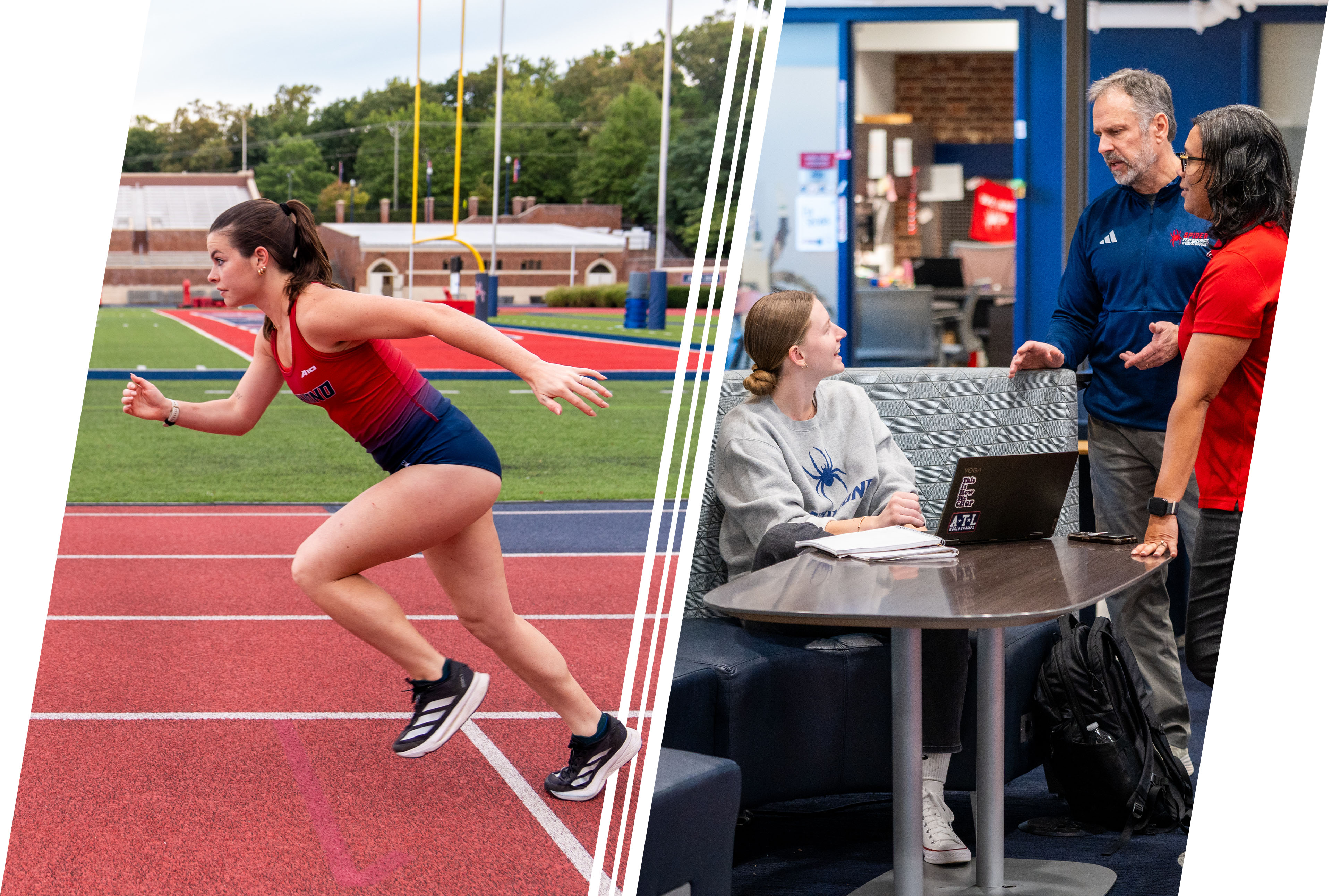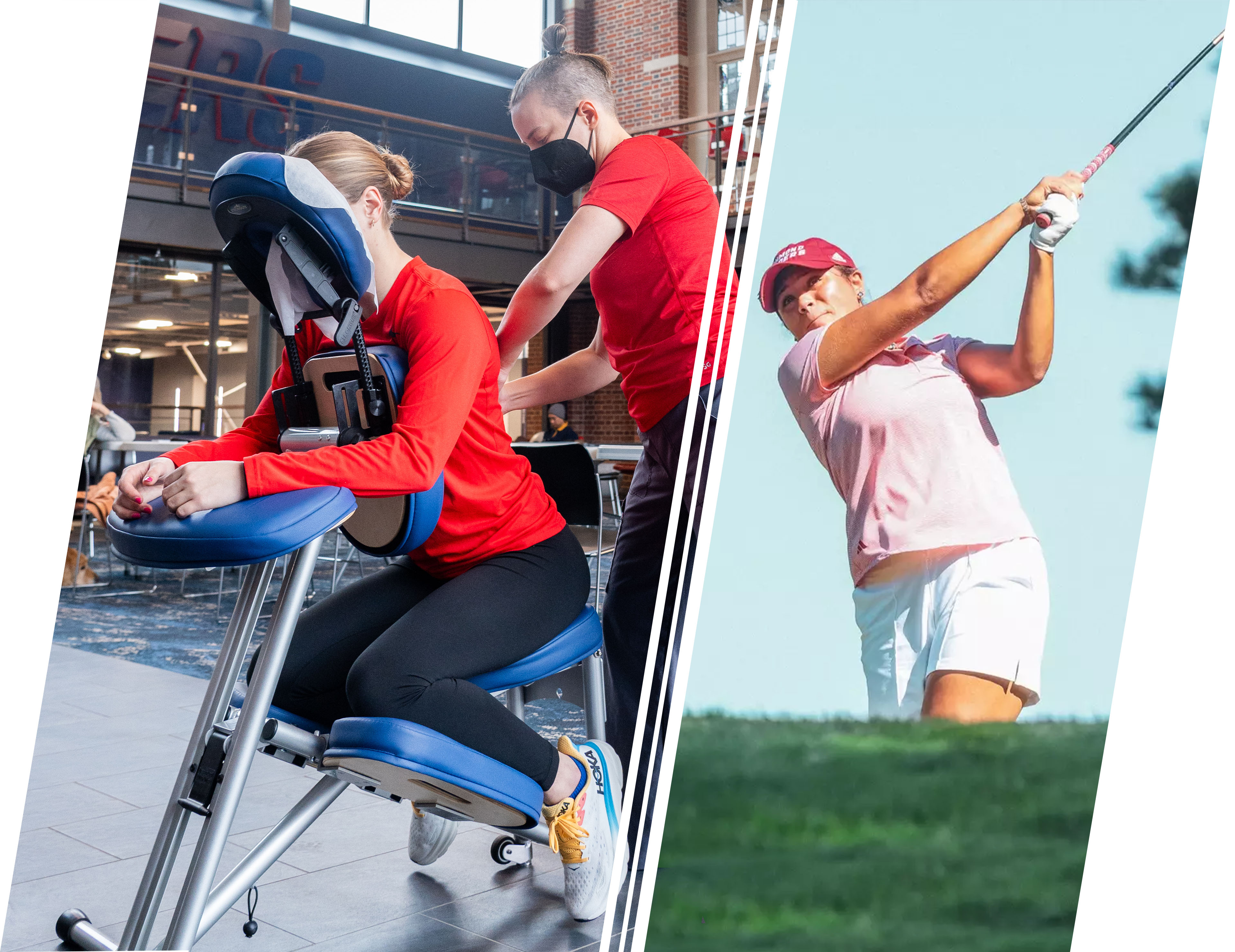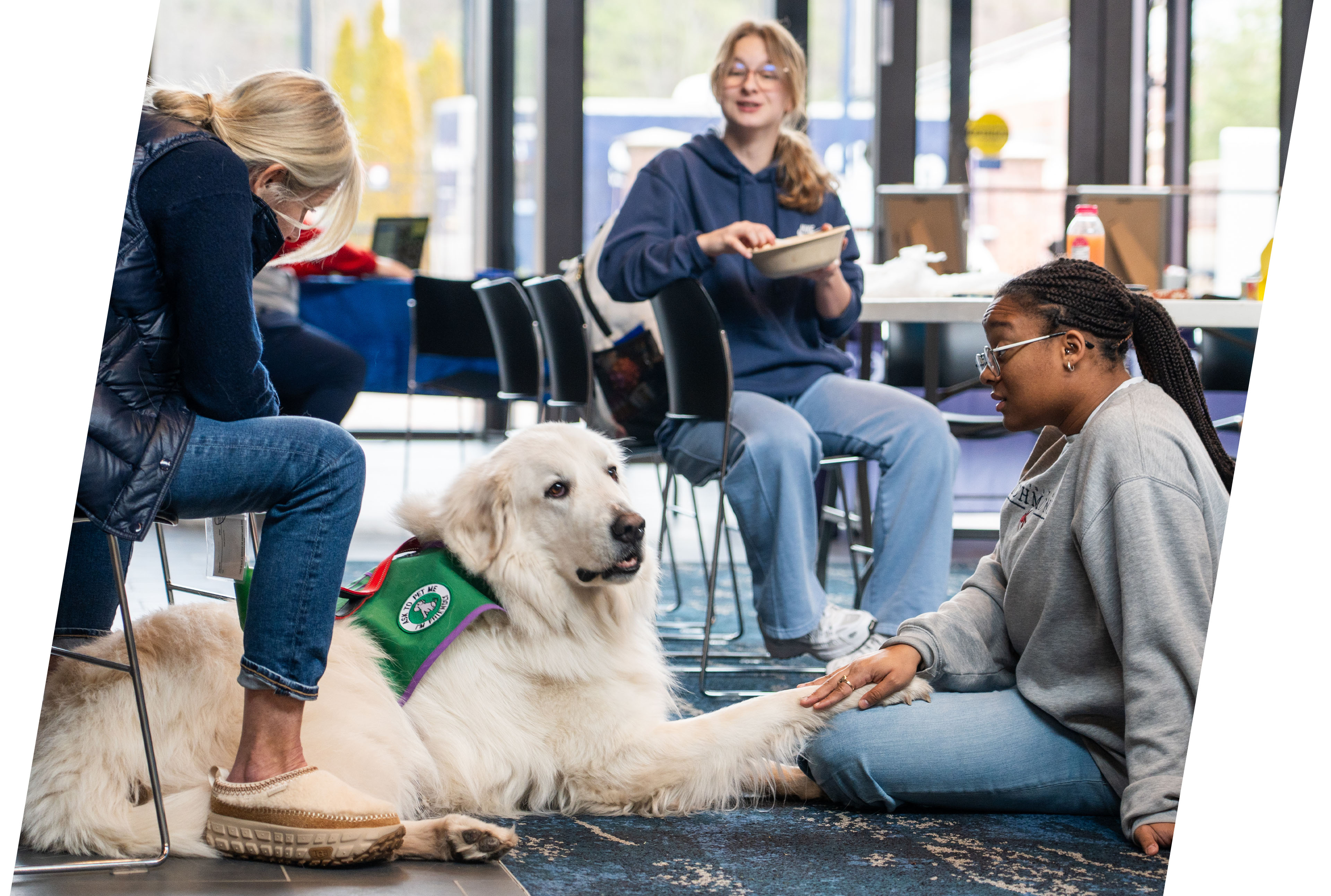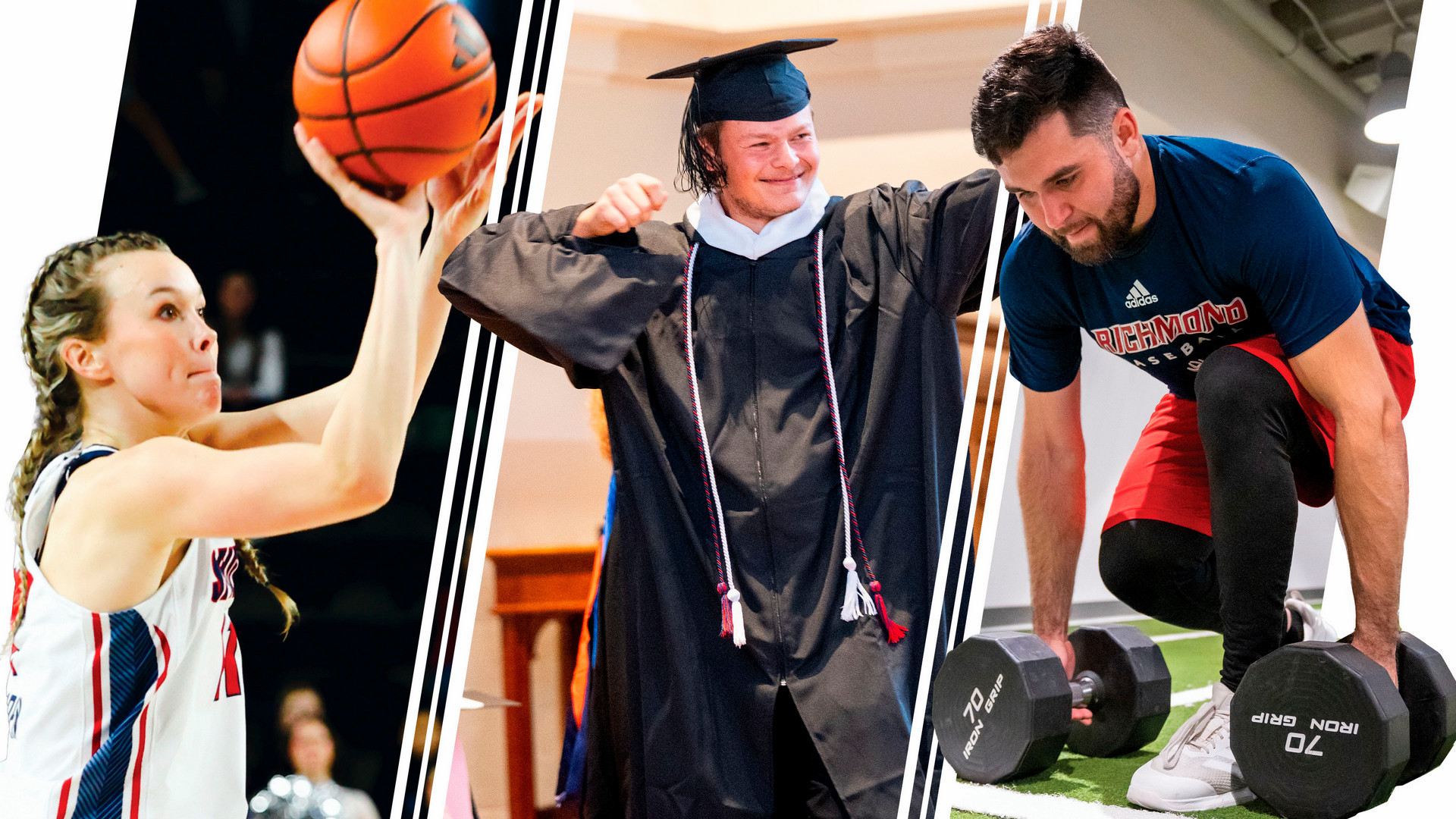FEAR CAN RATTLE THE MOST TALENTED AMONG US. Despite her accomplishments, it has sometimes gotten ahold of distance runner Izzy Blaylock, ’25.
She was the top freshman performer in the 1,000-meter run at the Atlantic 10 championships in her first year. In her junior year, she received All-East honors for her performance in the 1,000-meter run at the Eastern College Athletic Conference championships. She also has received awards for her academic achievement and civic engagement. Still, the road has not been easy.
“I really struggle with all these things on my plate, and so often I’m trying to make everything work and sometimes pieces slip,” she says. “I think I just put too much pressure on myself to fit the role of a perfect person.”
Blaylock says the pressure has sometimes left her with paralyzing anxiety.
“There was a point in my life where I thought, ‘If I get on that line right now and it goes poorly, everyone’s going to think that I’m not worth anything,’” she says.
For Blaylock, one key to breaking this cycle of negative thinking has been the support of others. After arriving at Richmond, she realized quickly that her team wasn’t just her coaches and the teammates running alongside her. She had another entire team of Spiders behind her.
The team looking out for Blaylock — and all other Spider student-athletes — is organized through a program called Spider Performance. Known informally as SP4, it is Richmond’s signature student-athlete success program. SP4 brings together coaches, tutors, psychologists, advisers, mentors, doctors, trainers, faculty, and others to provide an elite level of coordinated, comprehensive, and individualized support for every Spider who competes in one of UR’s 17 Division I sports. SP4’s goal is to give them all the best opportunity to become champions on the field, in the classroom, in their careers, and in their personal lives.
“I’m truly indebted to them,” says Blaylock. “I wouldn’t be here without them.”

Lauren Wicklund, senior associate athletic director, is one of the people Blaylock leans on for support. Wicklund says SP4 is the result of a goal she and athletics director John Hardt have been working toward for years: to create the best student-athlete support system in the country.
“We knew it was more than just strength and conditioning, more than just leadership or academics or well-being,” explains Wicklund. “It was all of those things combined.”
Spider Performance is abbreviated SP4 because it focuses on four areas of student-athlete success: athletic, academic, personal, and professional achievement. For athletes, SP4 starts even before they arrive at Richmond and is the road map of their athletic and academic journey. Many student-athletes don’t even realize it’s happening, and that’s kind of the point.
“There are times when it will be really pronounced, like when you’re a first-year or when you’re getting ready to go into your senior year,” Wicklund says. “But for the most part, they are not seeing what we’re doing behind the scenes to make it all happen.”
“We knew it was more than just strength and conditioning, more than just leadership or academics or well-being. It was all of those things combined.”
For example, teams use sports science and technology to gather analytics on athletes and create custom workouts to boost performance. At the same time, advisers, tutors, and mentors help athletes manage their coursework, labs, and presentations. Doctors and therapists provide nutrition plans and mental health support, while trainers serve as onsite physical therapists. Career counselors help student-athletes line up internships, prepare for interviews, and build the skills necessary for their future careers. Other staff members arrange leadership, team-building, and personal development programming on everything from financial literacy to cooking classes to learning to change a tire. SP4 is, by design, a comprehensive approach to doing all of it well.
“Students coming into college often struggle with connecting to resources,” says Wicklund, who has been at Richmond for seven years and has made her career in collegiate athletics. “If you want to have the best experience possible, you’ve got to understand how things work and where the resources are.”
Wicklund has worked hard to put all those resources together. She’s seen student-athlete support programs of various shapes and sizes, but she says that few do it as well as Richmond. She attributes that to the SP4 team’s willingness to collaborate.

On Track for Success
One of the best words to describe Blaylock is “driven.” She’s a double major in philosophy, politics, economics, and law (PPEL) and history and ran cross-country and track for the Spiders. This means she ran all year long for all four years. She also served on the A-10’s Student Athlete Advisory Committee, completed three internships, and held the highest GPA of any Spider athlete graduating in 2025.
“Izzy is special,” says R.D. Montgomery, associate director of student athlete success and part of the SP4 team. “She’s very self-motivated, very smart, very driven, and she’s extremely ambitious.”
Montgomery arrived at Richmond about the same time as Blaylock. In that time, he’s watched her juggle a hectic track schedule, a full academic schedule, and internships at Virginia’s state Capitol and in Washington, D.C.
“The hardest thing for me with Izzy is to scale her back,” says Montgomery. “Because she wants to do it all.”
Blaylock, the seventh-generation Texan, says her goal is to work in politics. She will begin law school at the University of Virginia in the fall.
“I’m doing this for something bigger,” explains Blaylock. “I’m doing this to make other people’s lives around me better.”
Despite all that Blaylock has accomplished, the law school application process was a big hurdle for her. She worried in particular about writing her personal statement. She reached out to Montgomery, who then reached out to Brandon Metheny, director of admissions at Richmond Law. Metheny agreed to serve as a mentor, and the rest just fell into place.
“The woman Izzy interviewed with at UVA just happened to be the mentee of Brandon Metheny,” says Montgomery. “They hit it off instantly, and that’s how networking works. I just helped guide a little bit, but she did 99% of the work.”

“I view [being a professional athlete] as being a small-business owner. You’re a brand. You must hire an agent and a manager. You now have employees.”
Most of what Montgomery does helps student-athletes secure a job. The process begins in the student-athletes’ first year with just a simple introduction, and it ramps up as they move through their four years.
He says his role is especially important for first-generation students who don’t know how college works — let alone the networking aspects of it.
In many cases, students will have jobs waiting for them. Such is the case for Brian Reinke, ’25, a baseball player who found a position with CapTech before graduation. The same is true for Sofia Mancino, ’25, a soccer player who has accepted a position with AT&T in New York before commencement.
In cases where a student-athlete is focused on turning pro in their sport, Montgomery preps them too.
“I view [being a professional athlete] as being a small-business owner,” says Montgomery. “You’re a brand. You must hire an agent and a manager. You now have employees.”
Of the 99 student-athletes in the Class of 2024, 59 reported having secured a job before graduation; 25 went to grad school; two took a gap year; and six became professional athletes. The remaining seven did not respond to the survey.
“I’m excited. We really have good kids,” says Montgomery. “I help them find information to make decisions about their future: ‘Let’s figure out what you’re into. Like really dig in and figure out who you are.’”

Comprehensive Support
Golfer Maya Beasley and tennis player Cole Brashear might not appear to have much in common, but they’re more alike than they are different.
Both left home as teenagers to live at sport-specific academies, she in Hilton Head, South Carolina, and he in Las Vegas. Both will graduate in 2027. Both are bonded to their teammates. And both have won a championship since arriving on campus.
They have also both faced challenges when managing their academics and personal success. But they also agree that one of the biggest challenges has been making friends outside their sport.
“I’m part of Theta sorority on campus,” says Beasley. “I joined this year because sometimes you just need a little bit of an escape from it (sports), and it’s cool to be able to do both.”
Brashear took a little longer to adjust. “For me, it’s been very easy to open up and talk to all my teachers and coaches,” says Brashear.
Brashear, a men’s tennis player from Georgia, says he took advantage of opportunities to sit down with Rachel Turk, SP4’s full-time psychologist. He said Turk mostly listened, but it was enough to help him work through his feelings of isolation.
Brashear says he has taken advantage of as many SP4 offerings as possible. Despite being a longtime athlete, he says he’s never had access to this level of resources.

“The facilities and the resources that we have here will make anyone better.”
“I started having pretty intense back problems last year,” says Brashear. “[The athletic trainers] have been helping me through that this entire time. I’m still seeing them three or four times a week, so that’s been very nice. And that was surprising. I didn’t think it would be that extensive.”
Ensuring that students have the support they need when they need it most is an important part of SP4’s approach.
“We see these students at their most vulnerable time,” Wicklund says. “They come in stressed out about a grade or a class, and our academic coordinators work diligently to support them. The same is true for when they’re fighting through tough things like their mental health. We get them with the staff psychologist. We started to notice when periods of high stress were and implemented programs such as Wellness Wednesdays where we bring in the therapy dogs or offer massages.”
Brashear and Beasley both say they have used tutors to help them with classwork. Sometimes those tutors are other athletes. They can also be students from across campus.
“My academic adviser is Isabelle Rose,” says Beasley. “If I have a question about anything or need a tutor, she’ll set it up, and they will be in the Millhiser study hall waiting for me. They can help me with anything I need.”
Beasley, a PPEL major, grew up in New York state but now calls North Carolina home. She and her teammates just won the first Atlantic 10 Women’s Golf Championship.
Beasley said she knew she wanted to come to Richmond as soon as she visited campus, but she’s been “blown away” by the support system and opportunities curated through SP4.
“The facilities and the resources that we have here will make anyone better,” explains Beasley. “I’m going to Spain this summer to study abroad. It’s normal for [non-athlete] students to go abroad. Now I get to do it, too.”
She doesn’t plan to play golf while in Europe and will instead enjoy the down time, a break that people throughout her support system encourage.
“If anything, I’ve learned from my coaches that it’s OK to take a day off and really focus on recovery,” she says. “I think honestly that’s what’s made me stronger.”

Collaboration takes center court
On Anna Camden’s first day on campus with her new team, in her first 20 minutes of practice, before she’d made one friend, she went down on the basketball court, her knee throbbing with pain she’d never experienced before.
Camden, a 6-foot-3-inch forward, graduated from Penn State the previous spring. She transferred to Richmond as a fifth-year student-athlete to play basketball as a Spider during the 2023-24 season.
Sara Spencer, an athletic trainer at Richmond, was the first to render aid and evaluate Camden’s knee. She called on senior athletic trainer Andy McPherson for a second opinion. The two knew Camden had torn her ACL, but they held back that news.
“How do you share that information?” McPherson says. “‘Hey, your ACL is torn, and you’re done for the season.’ That’s not the time or place because of [her] vulnerability and emotions.”
Instead, the pair notified the team orthopedist and secured appointments for the following morning. Spencer arrived at 7 a.m. to drive Camden, who was now on crutches, to the doctor.
“Sara was my first friend,” Camden says. “It was like a forced friendship, but she was the first person [apart from my coaches] that I had a connection to at Richmond.”
After coming to terms with the news that she had torn her ACL, Camden faced a list of choices. They included when she was going to have surgery, where she was going to rehab, and even whether she was going to stay at Richmond for grad school or just retire from basketball.
“I could have easily been like, ‘Clearly this isn’t meant for me,’ and been done,” Camden says.

Anyone who’s ever torn an ACL can attest to the fact that the injury is life-altering and humbling. For a Division I athlete, the injury is devastating. There’s a point in the first stage of the injury when you realize you are fragile, perhaps for the first time. You must also come to terms with the fact that no matter how much you will yourself to walk or play again, you physically cannot.
Camden says McPherson quickly shifted his support to addressing her well-being more broadly.
“I said, ‘I don’t think I have any fight left in me,’ and he just looks at me, and says, ‘Yes, you do,’” Camden says. “Just very gently, ‘Yes, you do. You have fight left.’ I started crying. I believed him.”
For the next nine months, McPherson, Spencer, and head strength coach Beacher Porter worked hard to get Camden ready for a comeback. More than her athletic performance was on the line. The work included reaching out to academic advisers to set up Camden’s class schedule and coursework, getting a temporary disabled parking placard for her car, and helping her grab meals. She juggled it all while getting back to walking, then running, then jumping, and finally playing.
“There were times when she was in there twice a day,” Porter says. “If it had been up to her, we would have been in four sessions a day.”
To call Camden determined is putting it lightly. Five days after surgery, she was off her crutches. Days later, she was in rehab doing hurdles and getting bored. Spencer recalls how fast Camden wanted to move.
“She was like, ‘When can we get out on the court?’ and we were nowhere close,” says Spencer. “Andy and I were like, ‘Slow down. You were on crutches last week.’”
Camden spent a lot of time on the underwater treadmill and doing rehab with Spencer. Once she was cleared to go harder, more work with Porter got her back to her athletic self. She documented much of it on her social media, where she has more than 400,000 combined followers on TikTok and Instagram.
“It takes a lot of people, but also it takes individualized attention at each spot,” adds McPherson. “It’s not a cookie-cutter recipe.”
The Camden recipe worked. Spencer remembers Camden’s first game back.
“We opened against Temple in Philly, and I’m pretty sure there was a group text between Andy, Beacher, and me, and it said, ‘I’m not crying, you’re crying,’” recalls Spencer. “Andy had tears. I had tears. It’s just one of those things, when you put all this effort in and finally see — she did it. That’s good.”
Another crowning achievement for Camden applies to her education. The extra year on campus meant she was able to complete her two-year master’s degree and graduate following her final basketball season.

One Richmond
Porter says SP4 is the biggest change in his work as a strength coach because of how it has given his colleagues the opportunity to create optimized plans for Spider athletes.
“It has allowed us to all come together,” says Porter. “I have my expertise. They have their expertise. It’s not about one of us more than the other.”
McPherson agrees. He says SP4’s alignment means there are fewer hoops to jump through so the team can pivot and get someone like Camden help immediately. He thinks of it like a theater company. He says student-athletes are the performers while the doctors, trainers, coaches, staff, and faculty are the stage crew: You don’t see the set building or costume designers — but it all happens behind the scenes to support what you do see from your seat.
“This is the most collaborative place I’ve ever worked,” Wicklund, SP4’s director, says. “From the faculty to the dining hall and nutritionists to maintenance and facilities, everyone is so collaborative here.
“That’s why we can dream big, and I love that.”
